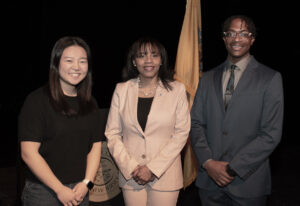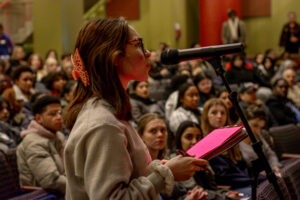- About Ramapo
- Academics
- Admissions & Aid
- Student Life
- Athletics
- Alumni
- Arts & Community
- Quick Links
- Apply
- Visit
- Give
2024 Diversity Convocation: NJ Lt. Gov. Tahesha Way Encourages All to Be Present

March 4, 2024
by Liz Mendicino ’26
Sharp Theater became a place where diversity converged, passions were ignited, and a tapestry of unity was woven within the campus community during the 2024 Diversity Convocation, sponsored by the Office of Equity, Diversity, Inclusion and Compliance (EDIC). Ramapo College welcomed New Jersey Lieutenant Governor Tahesha Way as the keynote speaker, who reminded the Ramapo Community to “be present.” To a packed house of students, staff, faculty, friends, and trustees buzzing with excitement, President Cindy Jebb, Ph.D, Vice President and Chief Diversity Officer Nicole Morgan Agard, Esq., Student Trustee Gloria Jeong, and Student Government Association President Victor Oluwagbemi opened the program.
In her opening remarks, President Jebb stressed that Ramapo puts forward a culture of belonging, that the community must hold one another accountable and elevate the voices that often go unheard. She additionally emphasized the importance of DEI and in serving the community, serving one another. “We know who we are, and we know our identities are our assets. Our diversity makes us better, smarter, and kinder,” said Jebb.

Student Trustee Gloria Jeong, Lt. Gov. Tahesha Way, and SGA President Victor Oluwagbemi
Student Trustee Gloria Jeong and Student Government President Victor Oluwagbmi then took the stage to introduce Lt. Governor Way. She serves as New Jersey’s 3rd Lieutenant Governor, and was appointed by Governor Phil Murphy on September 8, 2023, to fill the term of the late Lieutenant Governor Sheila Oliver. She additionally serves as the state’s 34th Secretary of State, a position she has held since the beginning of the Murphy administration. Lt. Governor Way is a graduate of Brown University and the University of Virginia School of Law, as well as a strong advocate for financial aid, youth voter engagement, equal protection under law, and inclusive census counting.
Way began her speech by telling the story of her parents. Her mother was a railroad clerk and her father a city bus driver. She described her parents above all as public servants, who instilled values of strong worth ethic, kindness, and grace to her from a very young age. As a young girl growing up in the Bronx, her mother encouraged her to ‘be present’ simply to take up space in the room and show up for herself. Her parents showed her, despite not having college degrees, that education would empower her, not just to succeed, but to do good in the world.
Way touched on her experiences at Brown University, how joining Alpha Kappa Alpha Sorority, Inc. helped her have a support system when recovering from a near fatal brain hemorrhage. Revitalizing her school’s NAACP Chapter helped her find her passion. She noted that none of this would have been possible for her if not for the financial aid package she had received to go there. Financial aid reduced the barriers for her and continues to do so for students like her who are qualified but may not have the financial means to afford an education.
The speech continued into her experiences as a minority at both Brown University for her undergraduate degree and University of Virginia for law school. Way delved into her experiences working as an attorney in private practice, an adjunct professor of writing and literature, a producer for Court TV, and a state administrative law judge. “When many people entered my courtroom, I’d see their eyebrows shoot up their forehead in surprise when they saw me, like oh, she’s the judge,” Way said. “I look forward to the day when people are no longer shocked to see a Black person or a woman in the position of authority,”. Way captivated the audience, delivering emphatic words of inspiration met by thunderous applause following each point made. The Sharp Theater is full, not just in seating, but of life and energy..
Way reminded the audience that diversity does not only refer to race, but also includes age, noting that many of the residents who become poll workers on Election Day are often older. She encouraged students to become poll workers. While highlighting the $21 per hour pay, she focused more on the importance for youth to get involved with voting and civic engagement. She refers to the Census Complete Count Commission and the New Jersey Division of Elections as the ‘fraternal brothers of democracy’, noting that the census is an opportunity for New Jersey’s diverse population to get the funding and resources they need and deserve.The elections serve as a chance for every population to have their voices heard and see themselves and their lives represented at the state and national level. The lieutenant governor works to make New Jersey a place that ensures every citizen can cast their vote freely and fairly, and where no person is left behind. Way emphasized that this mission is furthered through projects such as the upcoming Black Heritage Trail and diverse, comprehensive programming surrounding America’s semiquincentennial that tells stories of all people in the revolution, not just the ones that are typically told.
“I’m proud to highlight the work our administration has done to invest in education, because we know that it is the great equalizer,” Way said emphatically, in reference to her work in the Governor’s office. “We understand that college students’ mental health is important, that means college affordability must be a priority, because the next generation of leaders should not have to curtail their dreams due to their family’s financial circumstances,”
Her voice rang powerfully through the theater. She addressed the importance of having women in positions of power and authority, pointing to the example set by Governor Murphy, who appointed the first majority female cabinet in New Jersey’s history. Diversity is not about checking boxes for Way, sharing, “It is an understanding that when we are asked to serve all the people, our teams must look like our communities and must reflect the experiences and perspectives we find across New Jersey.”
Lt. Governor Way closed with the importance of diversity and representation on every level, emphasizing, “We should embrace individuality, embrace people as their full authentic selves rather than trying to make everyone the same,”which drew an emphatic cheer from the crowd. “And we’re richer for it…especially in government, where it isn’t just our goal, but our lawful responsibility to serve ALL the people.” She stressed to the crowd that everyone has the ability and responsibility to make more diverse, inclusive, and safe spaces so that ultimately a better world can be created. The crowd erupts in applause at her conclusion; a long, loud, boisterous appreciation from the Ramapo College community.
The Convocation opens to the Q&A portion of the program. Sophomore Desiree Bounds stepped up to the mic and asked what is important to remember when one feels like they don’t truly have their right to vote. Way responds by encouraging education on one’s many options to vote. Be strong and powerful in your voting, make your voice heard. Another student asked for more information on poll working and other such opportunities to get involved. The Lieutenant Governor responds with the story of Laura Wooton, a Black woman who worked polls for 79 years, through the civil rights era and onward until she passed. “If she can do it, you can do it too,” Way said, encouraging the student to ‘pass it on’ and get involved in any way they can find.

An RCNJ student asked Way what has been her biggest career challenge.
One final student asked Way what her greatest career challenge has been. There is a moment of silence as the Lieutenant Governor thinks. “It’s always been who I am,” she says. “You graduate from Brown University, graduate from a top 10 law school, you walk in and say ‘Tahesha Way for plaintiff’, and there are folks who look at you and say ‘Oh, so you’re the assistant on the case?’ and then again as a judge.” The air is sucked out of the room. She continued, circling back to her mother’s message of Be Present, how she has carried it forward into every meeting as Secretary of State and on to her four daughters. “That’s the beautiful thing about having so many different voices,” she said. “It’s not about ‘Oh I’m better than this race or gender’. No, because we’re all the same. We all breathe the same air and sustain ourselves with food.”
Copyright ©2024 Ramapo College Of New Jersey. Statements And Policies. Contact Webmaster.

Follow Ramapo